James R. Callan's Blog, page 9
November 17, 2017
Helping a Stranger
I received this from an Austrailian author, Kitty Boyes. I don’t often  post these, but I thought this raised a question sufficiently interesting that I would put it up. I would love to hear if any of you have experienced this – help a stranger and have it change your life.
post these, but I thought this raised a question sufficiently interesting that I would put it up. I would love to hear if any of you have experienced this – help a stranger and have it change your life.
Have you ever helped out a stranger only to have it turn your normal life into something that resembles a nightmare?
Arina did.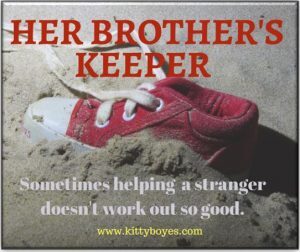
After a dead man is discovered in one of her motel units, his only relative, an older sister, asks Arina to help her. The sister believes her brother was murdered.
Despite being dissuaded from getting involved, true to form, Arina dives in. Head first.
Without knowing exactly what she was getting into, she inadvertently puts lives on the line. Including the life of her two-year-old son, Ben.
Money laundering and multi-million-dollar tax evasion scams are uncovered. Ruthless and desperate people will do all they can to avoid detection to protect their interests. Including murder.
Released in e-book late November 2017 and in paperback late December 2017. Book Three ‘HER BROTHER’S KEEPER’ of the Arina Perry Series takes a phycological ride on the wild side.
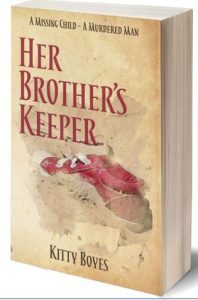
LINK TO THE NOVEL https://www.amazon.com/Her-Brothers-K...
Have you had the experience of helping a stranger, and having it really affect your life – good or bad – or maybe just a change? Leave us a comment and tell us about it. Thanks.
November 10, 2017
What’s The Big Idea?
Today’s guest blogger is M. L Hamilton. She taught English  and journalism for over twenty years. Now she writes mysteries and cozy mysteries She also enjoys reading, knitting, amateur photography, and spending time with her family. She and her husband live in Texas. She will also give a free copy of one of her books to a person leaving a comment – selected at random.
and journalism for over twenty years. Now she writes mysteries and cozy mysteries She also enjoys reading, knitting, amateur photography, and spending time with her family. She and her husband live in Texas. She will also give a free copy of one of her books to a person leaving a comment – selected at random.
“Where do you get your ideas?”
This is one of the most common questions asked of writers. The answer may surprise you.
A writing instructor at a recent conference said writers are “weird.” He illustrated this with a hypothetical situation where a close friend has been in a terrible accident. The writer makes a visit to the hospital where the friend is lying in bed, possibly unconscious. The writer approaches the bed, take the friend’s hand, leans over and thinks—How can I write this into a scene? I’ll have to ask the doctor the name of that machine….
Every writer in the room nodded in understanding. Whether by nature, training, or a combination of both, fiction writers tend to think differently than the general population. We find possibilities everywhere we go.
Daily life: My first novels came out of my experience growing up at a youth camp.
Another author I know developed a mystery after noticing the sound of her husband’s footsteps coming down the hall. Walking her dogs on a dark, shadowy street inspired yet another mystery.
Overheard conversations: Be careful what you say in public. Many authors make a habit of eavesdropping on conversations in restaurants, on public transportation, or anywhere people are talking. A line taken out of context can blossom into a full-blown story.
Signs: Sometimes, an odd sign draws an author’s attention and imagination. I once found a great title for a novel on a street sign. Now if I can find the story that goes with it.
Imagination: Writers enjoy playing the game of What if? Nearly every time I set out on a journey, I think, what if I’m in an accident? How will my family know? Who will tell them? How will they react? Perhaps a less tragic idea came from my family’s discussion about the possibility of our older son returning from military service and attending college with his younger brother. What if they ended up rooming together? With seven years between them, it might make an interesting twist on the Odd Couple.
Newspapers: Most people get their news from electronic sources these days, but all kinds of stories come out of the pages of a newspaper. Take any top news item, give it a few twists and you may have a bestseller. Even more fun is to find a story you weren’t even looking for, like the elderly woman who arrived at a retirement home with only a jacket, purse, cane, and a medical card as her sole form of ID. Though alert and friendly, she refused to give any background information other than to speak of her husband who had passed away many years earlier.
I ran across this story years ago when I was first studying how to write fiction. I remember thinking, Ooh, now there’s a story! Soon I was playing What If? What if she were hiding from greedy relatives who wanted her fortune? What if she secretly robbed banks and was hiding from police? What if she were a former teacher and…well, if you’re interested, you’ll have to read the book to see what else I came up with.
 Here’s a blurb from her latest novel, Pendant. A field trip gone awry. A student gone missing.
Here’s a blurb from her latest novel, Pendant. A field trip gone awry. A student gone missing.
Haunted by a teacher’s worst nightmare for more than a decade, Elaine finally stumbles across a vital clue—and discovers someone will do anything to keep the truth buried.
When her life is threatened, she allows the one person she trusts to whisk her away to safety in Texas. But assuming a false identity and hiding among the quirky residents of a retirement home is not what she had in mind.
Now Elaine must solve the mystery from afar, as soon as she figures out if her friend is keeping her from danger…or keeping her from the truth.
Available through Amazon at: https://www.amazon.com/Pendant-M-L-Hamilton-ebook/dp/B076JSK3H9/ref=sr_1_1?ie=UTF8&qid=1508515820&sr=8-1&keywords=pendant+by+M+L+Hamilton
Also available through B&N, KOBO and iBooks
Website: www.maryhamiltonbooks.com
Please leave a comment on where your story ideas come from. She will give a free copy to one of those who leave a comment.
November 4, 2017
Bloom Where You Are Planted
Our guest today is Lynn Hobbs. She is an award-winning author of inspirational Christian fiction and biographies. Each book in her first series, Running Forward, a powerful faith and family saga, won first place for Religious fiction in the Texas Association of Authors– book 1 in 2013, book 2 in 2014, and book 3 in 2015.
of inspirational Christian fiction and biographies. Each book in her first series, Running Forward, a powerful faith and family saga, won first place for Religious fiction in the Texas Association of Authors– book 1 in 2013, book 2 in 2014, and book 3 in 2015.
“I consider writing a tool to help people overcome adversity. I can provide relatable solutions through literacy.” Lynn Hobbs
Ever hear the old saying; “bloom where you are planted?” Sometimes it is not possible. Many small towns only offer minimum employment. Opportunities for job advancement are usually found in larger cities. I’ve enjoyed living in both environments with family in both areas, but what about those who can’t move?
What is life like for them? If they are in an economically poverty-stricken area, one can only imagine how they are struggling.
And what about those that do move? At what cost do they continue? Is there an alternative? Often not.
I base my observations on the county where I live in Texas. Statistics prove the majority of public school students qualify for free lunches due to their parent’s income.
Locals will recall when an ammunition plant closed here years ago. It was the only employer in our small town. Both men and women from surrounding towns traveled daily to work there. A decision was required to either bring in new industry at that location, or turn it into a Wildlife Refuge Center.
A vote was finally taken, and my group lost. We didn’t protest. No one blocked traffic unable to accept the voting outcome. Life continued, and the Wildlife Refuge Center is now well established. Many area wide schools bus their students to the Wildlife Refuge Center for interesting, and informative field trips. They also have hiking trails.
Most of the 25-55 year old residents moved to Dallas. I had thought it was hear-say that they left their children with their parents. They couldn’t afford child care. It proved to be accurate. I noticed the younger generation being raised by their grandparents when I later worked for the Texas public school system. I saw it firsthand. I saw how their lives changed, and I saw what it did to families. I did write about it without compromising anyone. I incorporated parts of their experience with other modern family issues in my earlier Running Forward Series.
In regard to this particular small town, I must emphasize it is different from most. It doesn’t matter if you are Hispanic, African-American, or Causation; we are all family here. We help each other. We have known each other’s families going back for three generations. Conditions could always improve, but overall, we are progressing. We now have a Family Dollar store that everyone supports. In many ways, it serves as a local gathering point.
Yet, I couldn’t help but wonder about the others; the ones who had to move. They didn’t see familiar faces every day. Strangers were a new way of life.
Yes, they’d eventually make new friends, and establish new routines, but for many, their way of life would remain unsettled.
As a published author, I felt drawn to write about being thrust in a new area, not knowing anyone. Clearly out of your comfort zone, who do you trust?
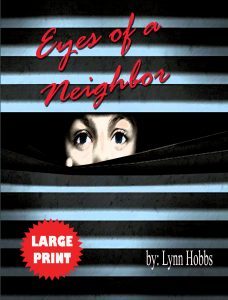 With this in mind, I began writing the American Neighborhood Series. Book one is titled, “Eyes of a Neighbor.” I’m currently writing book two, “Heart of a Neighbor,” to be released later this year, and will conclude with book three, “Mind of a Neighbor” scheduled for publication in 2018.
With this in mind, I began writing the American Neighborhood Series. Book one is titled, “Eyes of a Neighbor.” I’m currently writing book two, “Heart of a Neighbor,” to be released later this year, and will conclude with book three, “Mind of a Neighbor” scheduled for publication in 2018.
My stories have Christian values, hope, workable resolutions, and yes; I get many ideas from real life situations. Having worked in the public for over thirty years, I have witnessed many situations and heard numerous personal accounts from what others have experienced. I add to part of one, and as a writer, let my imagination soar.
In “Eyes of a Neighbor,” I introduce readers to the residents of a gated community. The character, Kate Davis, is one of three characters who move there without knowing anyone. Kate is learning who to trust when a murder occurs, and the murder becomes the number one priority. Due to reader requests, this series will be published in large print. Kindle version will remain in regular print. I invite you to enjoy my books and website at www.LynnHobbsAuthor.com
Blurb for Eyes of a Neighbor
“Eyes of a Neighbor” is book one of Lynn Hobbs new Christian Fiction Series, The American Neighborhood Series. The reader can expect to find real life situations that will be surprising. Her stories don’t have profanity or violence, but neither do they follow “cookie cutter” plots. Boy may meet girl and marry girl, but typical, romantic, happy endings are not always guaranteed. In Eyes of a Neighbor, you are introduced to a community with its residents of newcomers, and those who have lived most of their lives in this older, historical section of Houston. Based on the author’s own knowledge of having once lived in the Heights area, the residents she created include all age groups, and become tangled in a murder mystery. Suspense, intrigue, inspiration, and romance intertwine to create a fast-paced read that is indeed a page-turner.
You can contact Lyyn at: LynnHobbs.Author@gmail.com
And leave a comment here if you have a moment. Thanks.
October 27, 2017
The Cost of Survival
Today, we’re going to look at a new science fiction thriller by author J.L. Stowers.
Behind The Cost of Survival

The Cost of Survival is a science fiction thriller exploring the dark side of human nature from a world on the brink of destruction. Author J. L. Stowers asks the question, “What if humankind could no longer reproduce?” The answer is shockingly disturbing, but perhaps not too far from the truth if our dark history repeats itself.
The main character, Walt Marshall, is cynical and distrustful of the very government who hired him. Yet he can’t say no to a once in a lifetime mission to a remote area devoid of the masses and their overwhelming use of technology. He makes his new home outside a military camp in a war-torn valley in hopes to restore the area to its once fruitful nature. However, Walt quickly realizes things aren’t what they seem.
Walt stumbles upon an unspeakable secret regarding the truth as to why this valley was selected for colonization. Readers are immersed in Walt’s journey and internal conflict. The closer he gets to finding answers, the more he’s reminded of the emotional anguish he tried to leave behind. His path to the truth leads through espionage and treason all while forcing Walt out of his comfort zone. The longtime loner is forced to trust and rely on the people around him in order to uncover the facts.
This story is filled with twists, turns, and symbolism to keep readers on their toes. However, the best thing the first book in the Genesis Rising series has to offer is a glimpse at the lore fueling the trilogy. In the short story prequel, Project Genesis, we witness the discovery of the Genesis documents and the formation of the secret organization behind the translation. In The Cost of Survival, Walt Marshall experiences the mysterious language once more. We learn some of the information uncovered in the Genesis documents and more will be revealed throughout the series.
This incredible journey will take readers beyond what they’ve expected and it all starts with learning the secrets within The Cost of Survival.
Check out The Cost of Survival on Amazon here.
October 20, 2017
Attacked!
Today’s guest is Ada Brownell, author of six books and hundreds of stories and articles. When she sat down to write her latest book, The Peach Blossom Rancher, she drew from her experiences growing up in Colorado’s Peach Country near Grand Junction, picking peaches and working in a packing shed. In addition, she uses some of what she learned as a journalist on her beat covering a mental hospital, a former asylum, for The Pueblo Chieftain.
of stories and articles. When she sat down to write her latest book, The Peach Blossom Rancher, she drew from her experiences growing up in Colorado’s Peach Country near Grand Junction, picking peaches and working in a packing shed. In addition, she uses some of what she learned as a journalist on her beat covering a mental hospital, a former asylum, for The Pueblo Chieftain.
Now retired, Ada Brownell blogs and writes with Stick-to-Your-Soul Encouragement. She is the author of six other books and hundreds of stories and articles in Christian publications. She now lives in Missouri, a beautiful state except for tornadoes and chiggers.
Attacked!
By Ada Brownell
I knew better than allow the crowd to thin before my teenage daughter and I left the Andre Crouch concert in Downtown Denver. But Carolyn, a musician with perfect pitch who played Andre’s songs and loved his music, wanted his autograph.
The line to get to the singer squashed against the stage. So many came Andre gave up signing before Carolyn got the autograph. Outside, the crowd thinned to a trickle. Streetlights valiantly tried to penetrate the darkness, casting an eerie glow.
A few folks jostled down the sidewalk as we headed for the car. One small man meandered through the pedestrians toward us, crouched as he moved. I took my purse from my shoulder, put it in front of me and wrapped my arms through the strap.
The little man came closer and spat at us. Then he ran and jumped on me like a monkey, his arms and legs circling me. He held my head and arms tight against his chest, but I didn’t feel strength I’d expect from a man.
He’s just trying to scare me. But then I felt him trying to throw me to the sidewalk.
Carolyn screamed. As a singer she could reach a high C on pitch without even exerting herself and her chilling cries woke me up. I’d read if a man attacks you, fight and fight dirty.
I pulled one hand free, reached up, scraped off his glasses, and went for his eyes. Carolyn told me later she struck his back with her fists.
He let go, but stood staring, hands above him ready to jump me again.
“Jesus, help us!” I screamed. The sound echoed among the tall buildings, concrete and pavement.
The assailant looked the direction we had been going. A man with his suit coat flapping ran toward us.
The assaulter scurried the other direction and disappeared.
Carolyn and I, panting, took off the other way. We didn’t meet the man in the flapping suit coat.
“There’s…a…police station across the street,” Carolyn huffed. “Do you want to go there?”
“Yes!” I answered. I couldn’t read the sign. My glasses were gone.
We walked in the door and collapsed against the short dividing wall, gasping.
“May I help you?” the officer at the desk calmly asked.
Carolyn had to tell most of it. I could barely speak. She described the attacker and two officers hurried outside. Soon they walked back with a person between them.
“You caught him!” I said, thankful.
“Yes, but it’s a her not a him,” one policeman explained, as he held her in cuffs. “We found her down by the river under the bridge. She’s a psycho we’re run into before. Do you want to press charges?”
“Yes,” I answered. “I don’t want what she did to us to happen to anyone else.”
It wasn’t over. Not long before Halloween I received a disturbing call. It was her.
“Drop the charges,” she said. “I’m getting tired of being laid up in this jail.”
Panic surged. How on earth did she get my phone number?
“Why did you attack me?” I asked.
“I kept passing all these people high on God, and I had to do something.”
“Why were you dressed like a man?”
“Oh, I work for Wendy’s and I had to empty the trash. Do I hear children in the background? Are you going to drop the charges?”
“Sorry. I don’t want you attacking people.”
“Drop the charges!” The dial tone buzzed.
At night I feared opening our door. If she knew my name and phone number, she’d know my address.
The District Attorney phoned a few weeks later.
“If she goes into counseling and pays for your glasses and the doctor’s appointment will you drop the charges?”
I dropped the charges, but that wasn’t the end.
One day two or three years later the Denver District Attorney called me at our new address in Pueblo. “We have a murder case and might need you to testify about what this woman did to you.”
I’d never heard such a gruesome story. The gal had been living with an ex-con, crippled and in a wheelchair. Another man lived with them, too, and his body parts were strung in dumpsters all over a housing project. The head was in the refrigerator; the hands found at the airport in the suitcase of the fleeing ex-con.
I followed the story in The Denver Post.
When the case went to trial, the gal who attacked me pleaded the Fifth Amendment numerous times. As far as I know, she was never convicted. I was not asked to testify.
I still have questions. Was the man who caused the gal to turn and run an angel? Was my attacker demon possessed?
Only God knows, and I can live with that.
Here is a short blurb on The Peach Blossom Rancher.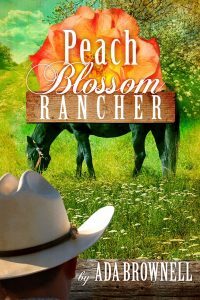
A handsome young man with a ranch in ruin and a brilliant doctor who is confined to an insane asylum because of one seizure. Yet their lives intersect. How will they achieve their dreams?
John Lincoln Parks yearns for a wife to help make the ranch all it should be after his uncle, a judge, ravaged it before he was murdered. John has his eye on his sister Jenny’s elegant matron of honor, Valerie MacDougal, a young widow. But Valerie, a law school graduate, returns to Boston to live since her little son was born. John and Valerie write, he’s kissed her a few times, but while in Boston Valerie and one of her father’s law partners try to get three patients wrongfully judged as insane out of the Boston asylum.
Will John marry Valerie or Edwina Jorgenson, the feisty rancher-neighbor who has been in love with John since they were in grade school? Edwina’s father is in a wheelchair and she’s taking care of their ranch. John tries to help and protect this neighbor who has a Peeping Tom whose bootprints are like the person’s who dumped a body in John’s barn. But John and Edwina fuss at one another constantly. Will John even marry, or be hanged for the murder?
Ada Brownell’s latest historical suspense/romance, Peach Blossom Rancher, is on sale via a Kindle Countdown. It starts on Oct. 19 at 8 a.m. PDT for only $0.99 and will slowly rise until reaching $3.99 at 8 a.m. PDT on Oct. 24. Click here for a bargain: http://ow.ly/4ETL302QdhW
October 13, 2017
An “Aha” Moment
Today, Gay Ingram gives us an interesting post on those little moments  of joy that pop up ever so often for a writer. Gay is a multi-published award-winning writer. She writes both fiction and non-fiction for both adults and young adults. She often publishes articles on the craft of writing. Today, she tells us how a casual question from her husband over dinner one night led to her recent book.
of joy that pop up ever so often for a writer. Gay is a multi-published award-winning writer. She writes both fiction and non-fiction for both adults and young adults. She often publishes articles on the craft of writing. Today, she tells us how a casual question from her husband over dinner one night led to her recent book.
Nothing gives me more satisfaction as a writer than to uncover some obscure bit of information that sheds light on the times I happen to be writing about. One of these aha moments occurred during a dinner conversation with my husband. Totally irrelevant to anything, he asked me the question, “Did you know George Washington was a surveyor?”
 Now that bit of trivia had always eluded me but his question aroused my curiosity. So I did some research and found out after his father’s death, George came across the man’s surveying tools and notebook. Many of the genteel landowners had their own surveying tools for private use, such as confirming boundaries, determining right-of-ways, laying out fields, and building sites.
Now that bit of trivia had always eluded me but his question aroused my curiosity. So I did some research and found out after his father’s death, George came across the man’s surveying tools and notebook. Many of the genteel landowners had their own surveying tools for private use, such as confirming boundaries, determining right-of-ways, laying out fields, and building sites.
George studied his father’s notes and with hands-on practice, taught himself a skill that led to a profitable occupation. There were books as John Gibson’s Treatise on Surveying or John Love’s Geodesia, but most learned their profession on the job, as George did.
Our first president heads the list of many familiar historical figures who were surveyors, Thomas Jefferson among them. His chairmanship of the committee that established the Land Ordinance Act of 1785 resulted in the establishment of our country’s General Land Office in 1812.
Henry Thoreau also did surveying and advertised his services widely in the Concord, Massachusetts area. A surveyor by the name of William Burt invented the solar compass in the mid 1800s. This ingenious invention greatly improved measurements as it was not affected by the magnetism from vast deposits of ore underground.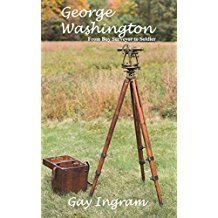
In case you’re wondering, all this fascinating information led to the writing of my recently released YR biography, George Washington, From Boy Surveyor To Soldier. All part of the interesting and challenging life of being a writer.
Thanks, Gay.
Of course, she did leave me out. My first job out of college was as a surveyor for the City of Dallas. (Well, yes, I did have a degree in English. But then, Thoreau was a poet.)
If you’ve had one of those “Aha moments,” tell us about it in a comment. We’d all like to hear. Thanks, jim.
October 6, 2017
A Clear Plan to Make $1,000,000
The title of this blog is actually a red herring. By that I imply, it is meant to mislead you, or cause you to follow a false path.
A red herring is an important and often necessary component of a good mystery. An example is Bishop Aringarosa in Dan Brown’s The Da Vinci Code. The reader is led to believe the cardinal is the center of the church’s conspiracies. Actually, he is a victim. Note, Aringarosa is a loose translation of red herring (aringa translates to herring and rosa can be pink or red). Brown offered a clue by the clever naming of a character.
The red herring can be deliberately introduced by the author, or by the antagonist. Some red herrings are accidental. They are not placed by any character, and perhaps not even the author. But circumstances occur that lead the reader in the wrong direction.
Red herrings are not limited to fiction. One has simply to watch a political debate to see examples. A candidate is asked a question. He (or she) makes a show of giving a detailed answer, but to a different question. The candidate is attempting to mislead the listener. By giving a detailed explanation (of something else) he distracts the listener from the fact that he is not answering the question asked.
Some say the term red herring goes back as far as the thirteenth century. But the first clear definition of red herring came from Englishman William Cobbert in 1807, indicating the press was laying a false trail, similar to his use of a red herring to distract the hounds from the real scent of the fox.
All writers should use a red herring here or there. Whether a mystery or a romance, an urban fantasy or a western, some misdirection is necessary to keep the reader interested. If we know the answers at the beginning, there is less incentive to plow through the rest of the book.
 Note, the red herring is different from the straw man, where something is posited so that it can be disproved. In other words, the red herring is used to mislead while the straw man is used to prove a point.
Note, the red herring is different from the straw man, where something is posited so that it can be disproved. In other words, the red herring is used to mislead while the straw man is used to prove a point.
You will be in good company using red herrings. Not only Dan Brown, but Agatha Christie and Sir Arthur Conan Doyle employed many. The Hound of the Baskervilles is an example of a classic red herring. The escaped convict or Barrymore appears to be the culprit.
Okay, since I want to play fair with my readers, I’ll get back to the title of this blog. Write a number one, New York Times bestseller which is made into an Academy Award winning movie. If it has a red herring in it, I’m sure it will make $1,000,000 f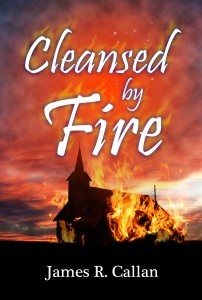 or you.
or you.
And yes, my Father Frank mysteries all contain red herrings.
We’d all love to hear your comments on
red herrings, straw men, and other fiction
elements – and not limited to mystery.
Thanks.
September 22, 2017
Marketing Your Book
Today’s guest is Dana Wayne, a sixth generation Texan. She  resides i the Piney Woods of east Texas with her husband of 39 years. She has two books published and each has won several top awards. She will give one person who comments (chosen at random) the choice of either a signed copy or a digital copy of her latest book, Mail Order Groom. So, here’s some good advice, and leave a comment for a chance at an award winning book.
resides i the Piney Woods of east Texas with her husband of 39 years. She has two books published and each has won several top awards. She will give one person who comments (chosen at random) the choice of either a signed copy or a digital copy of her latest book, Mail Order Groom. So, here’s some good advice, and leave a comment for a chance at an award winning book.
As an indie author hard at work on my third book, I have learned a lot about my craft. Some by trial and error, some from networking with fellow authors at various venues, and some from my own research or experience. Of everything I have absorbed about marketing over the last couple of years, three things stand out in my mind.
It is the single most time consuming – and important – piece of the publishing puzzle.
It begins months before your book is released.
It never ends.
When I started this journey, I had no clue what I was getting myself into. I simply wanted to write. I wanted someone to read what I wrote and enjoy it. I had no idea how much additional work would be required for this happen.
It’s not enough to write a good story; you must get the word out and keep it out in order to be successful. If you are fortunate enough to have someone handling the marketing component, you are my hero. But, for most of us indie authors, we do everything; write, edit, publish and promote. And, we must do it all on a shoe-string budget. Book signings are a given so I’d like to talk about some other ways to increase the visibility of you and your book.
I recently had the privilege of attending a marketing event sponsored by Texas Association of Authors, and gained a new perspective on this subject. A common thread was fan interaction, and social media is a huge part of that.
Email list – we all know this to be an invaluable resource
Allow fans a sneak preview of your book, the cover reveal, and to buy advance copies
Pick a Fan of The Month – gets special recognition on your website/social media
Host a contest where fans submit videos of them acting out a favorite scene in your book – feature the winner on your website.
Have fans post pictures of them reading your books.
Get to know your fans – poll their likes, dislikes and opinions on ideas for books, promotions, contests, etc.
Write a book where the fans decide what happens next.
Consider a fan page for major characters, especially if you write a series
More tips:
Media packet is a must
Short bio, photo, accomplishments/awards, positive endorsements
Excerpt from your book – maybe a hard copy depending on the circumstances
One page flyer with all this info in a concise, professional layout
Design useable merchandise for your book (t-shirts, pens, mugs, etc. Take-away from the marketing event: Paper swag, other than bookmarks/business cards is not a good investment)
Participate in an online book tour
Schedule a book reading
Retirement homes
Area schools/colleges depending on target age group
Local bookstores/coffee shops/libraries/hospitals
Contact local media about interviewing you (if your book is set in a real city, contact that paper about an interview)
If your book addresses a particular cause, partner with groups, clubs or other organizations that support it or similar ones.
Participate in local events/festivals
Create a book trailer (There are a number of free sites to do your own or have one professionally made)
Contests – Be creative. People love free stuff.
Offer to write genre-related articles to magazines
Host a seminar or webinar for aspiring authors
Be a presenter at a workshop, conference or writers meeting
A great resource, FREE, is at:
https://allfreelancewriting.com/book-marketing-timeline-from-pre-launch-to-post-launch/
The bottom line of all this is there are any number of ways you can spread the word about your book. A quick Google search will get you started. The only limitations are the time, and in some cases, the money you are willing to invest. It will be an on-going project requiring constant attention and participation to be successful.
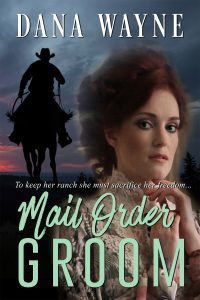 Short Blurb for Mail Order Groom:
Short Blurb for Mail Order Groom:
Emma Marshall is tough, capable and about to have her world turned upside down. Her father wants her married. She wants none of it. A jean-wearing, cattle herding, headstrong woman, she fights for her independence.
Tyler Roundtree is about to change all that. Sparks fly on their first meeting and she soon discovers she knows all about running a ranch and nothing about being a woman.
A world weary southern gentleman, a fiery, independent woman; a marriage of convenience was only the beginning.
You can find out more about Dana at her website: www.danawayne.com
or follow her on Facebook at: https://www.facebook.com/danawayne423/
or Instgram at: danawayneauthor
And add your thoughts on marketing in a comment for a chance to win an award-winning book. Thanks.
September 15, 2017
Conflict Makes the World Go Around
Today’s guest is J. R. Lindermuth, a retired newspaper editor  and the author of 14 novels, including six in his Sticks Hetrick crime series. He currently serves as librarian of his county historical society, where he assists patrons with genealogy and research. He lives and writes in a house built by a man who rode with Buffalo Bill Cody. Lindermuth’s latest novel is The Tithing Herd, a classic Western. He will give a digital copy to one of those who leaves a comment. I’ve read the book. I suggest you leave a comment.
and the author of 14 novels, including six in his Sticks Hetrick crime series. He currently serves as librarian of his county historical society, where he assists patrons with genealogy and research. He lives and writes in a house built by a man who rode with Buffalo Bill Cody. Lindermuth’s latest novel is The Tithing Herd, a classic Western. He will give a digital copy to one of those who leaves a comment. I’ve read the book. I suggest you leave a comment.
All of us are defined by our desires. What we want, as well as what we need to sustain our lives. What a person is willing to do to achieve these desires creates conflict, both within ourselves and with others.
These conflicts–big and small–make the world go around. That is, our personal world–how we navigate in our personal lives as well as in our interactions with other people.
Conflict, therefore, is a necessity in any work of fiction if we want readers to accept the “reality” of our characters. Kurt Vonnegut suggested writers make their characters want something on every page. These desires, no matter how small or seemingly unimportant, reveal the nature of the character.
Such little revelations may not be important to the overall plot, but they give even minor characters a hint of humanity, something the reader can relate to and help stimulate interest in your people. Still, they shouldn’t be mediocre. Some psychological crisis or a secret which could relate to the plot would be better than Charley J. worrying will he have enough cash left this week to paint his porch.
Lester Dent, the prolific pulp writer and creator of Doc Savage, suggested introducing the hero and swatting him with a fistful of trouble right at the start and keeping it up throughout the story. That’s certainly conflict and guaranteed to keep the pot a-boiling, essential in a pulp story. But sometimes it’s better to spread the conflict between all the major characters and sort out the problems between them as happens in real life. We’re all individuals, but relationships with others are important to our overall welfare. Action is important to move a story, but it doesn’t always have to involve gunfights or car chases to be interesting.
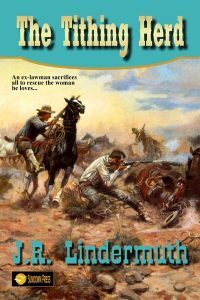
????????????????????????????
In my latest novel The Tithing Herd, Lute Donnelly is a former lawman obsessed with the idea of vengeance against the outlaws who murdered his brother. Lute is diverted first from his goal by compassion for Tom Baskin, a youth duped by the outlaws and falsely accused of rustling. Helping Tom enables Lute to regain a semblance of his true nature. He’s diverted once more when Serene McCullough, the woman he loves, begs his help in moving the herd cash-strapped Mormons have gathered to pay their church tithe. When the outlaws kidnap Serene and hold her ransom for the cattle Lute’s desire for vengeance is supplanted by desperation to rescue her.
Each of the other major characters in this story also have desires driving them to act as they do. Granted, most of those desires are of less significance than that of my protagonist, but they are essential to the action of the story and to their relationship with Donnelly.
The Tithing Herd is available from Sundown Press http://www.sundownpress.com/, the publisher; on Amazon, Barnes & Noble and other major booksellers.
For more about the author and his books visit http://www.jrlindermuth.net
And remember to leave a comment – even a short one – for a chance to receive a free copy of this classical western.
September 8, 2017
Write Out of Your Box
Today’s post is from award winning and Amazon Best-Selling  author, Ann Everett. In addition, Ann is a top reviewer on thenextbigwriter.com. She lives on a small lake in Northeast Texas where she writes, bakes, and fights her addiction to Diet Dr Pepper. Today, she suggests that writers should step out of their writing comfort zone occasionally. And she shares a short piece she wrote – out of her writing box.
author, Ann Everett. In addition, Ann is a top reviewer on thenextbigwriter.com. She lives on a small lake in Northeast Texas where she writes, bakes, and fights her addiction to Diet Dr Pepper. Today, she suggests that writers should step out of their writing comfort zone occasionally. And she shares a short piece she wrote – out of her writing box.
For the most part, I write steamy romance. However, for my own enjoyment, I like to step outside the “love” box and pen stories that mean something to me personally. Today, I’m sharing one of those short pieces. It’s based on an account that came from my daddy. He served in WWII and enjoyed telling tales from that time period. Many were funny. Some were serious. And some were downright disturbing.
Daddy’s gone now, and one of the things I miss most is his storytelling. Regardless of what genre you write, I encourage you to step out of your box and record childhood memories and family history.
It’s what I love most about writing…long after I’m gone, the stories will live on.
HELL IN PARADISE
Hell in Paradise. It’s a contradiction, but true. Biak Island, less than a degree off the equator has a constant daytime temperature of one hundred ten degrees, but at night cools down to eighty. It’s a beautiful sandy coral reef off the Northwest coast of New Guinea surrounded by dense jungle, crystal water, and a mountain range reaching six thousand feet. The terrain is rugged and the humidity, during the dry season, is so heavy it wears you down.
There are no white people on Biak, and all of them have malaria and hookworm. They do most of the shovel and pick work, helping set up our camp.
I’m one of two hundred fifty with the 92nd Evacuation Hospital which includes doctors, nurses, and personnel. We are rated for a particular job, but all do what is necessary and take great pride in being able to set up three medical tents in two hours. It is here, where we receive the first casualties from the 36th and 41st divisions of infantry.
I admit, at first, we resented the nurses, feeling women have no place in war. But it didn’t take long for us to change our tune. With death imminent, they became what the wounded and dying needed…Mother…wife…girlfriend. They cradled dying soldiers in their arms until they drew their last breath. And I can tell you from experience when a soldier dies, he calls out for God and woman equally.
Until this day, it bothers me when I hear someone refer to women as the weaker sex. They may lack physical strength, but there’s nothing weak about their resolve. They care. They comfort. They cry. Then they straighten their shoulders, dry their eyes, and carry on.
 Ann Everett embraces her small town upbringing and thinks Texans are some of the funniest people on earth. When speaking at conferences and to writing groups, businesses, book clubs, and non-profit organizations, she incorporates her unique brand of wit, making her programs on marketing, self-publishing, and the benefits of laughter, informative and fun.
Ann Everett embraces her small town upbringing and thinks Texans are some of the funniest people on earth. When speaking at conferences and to writing groups, businesses, book clubs, and non-profit organizations, she incorporates her unique brand of wit, making her programs on marketing, self-publishing, and the benefits of laughter, informative and fun.
Ten things you won’t know about Ann by reading her bio:
She’s married to her high school sweetheart.
She loves shopping at thrift stores.
She doesn’t remember her first kiss.
She hates talking on the telephone.
A really sharp pencil makes her happy.
She secretly wants to get a tattoo.
She thinks everyone should own a pair of cowboy boots.
She’s thankful wrinkles aren’t painful.
She sucks at math.
You can connect with Ann via Social Media —
Facebook https://www.facebook.com/AuthorAnnEverett/
Twitter http://www.twitter.com/TalkinTwang
Pinterest http://www.pinterest.com/loacl/



